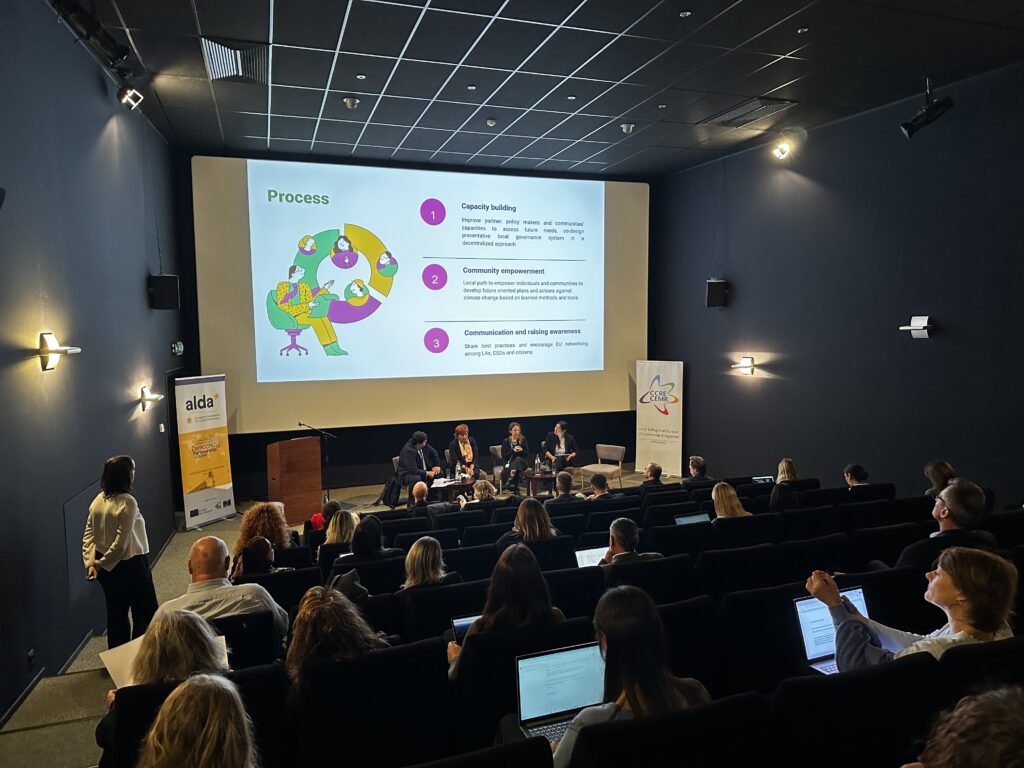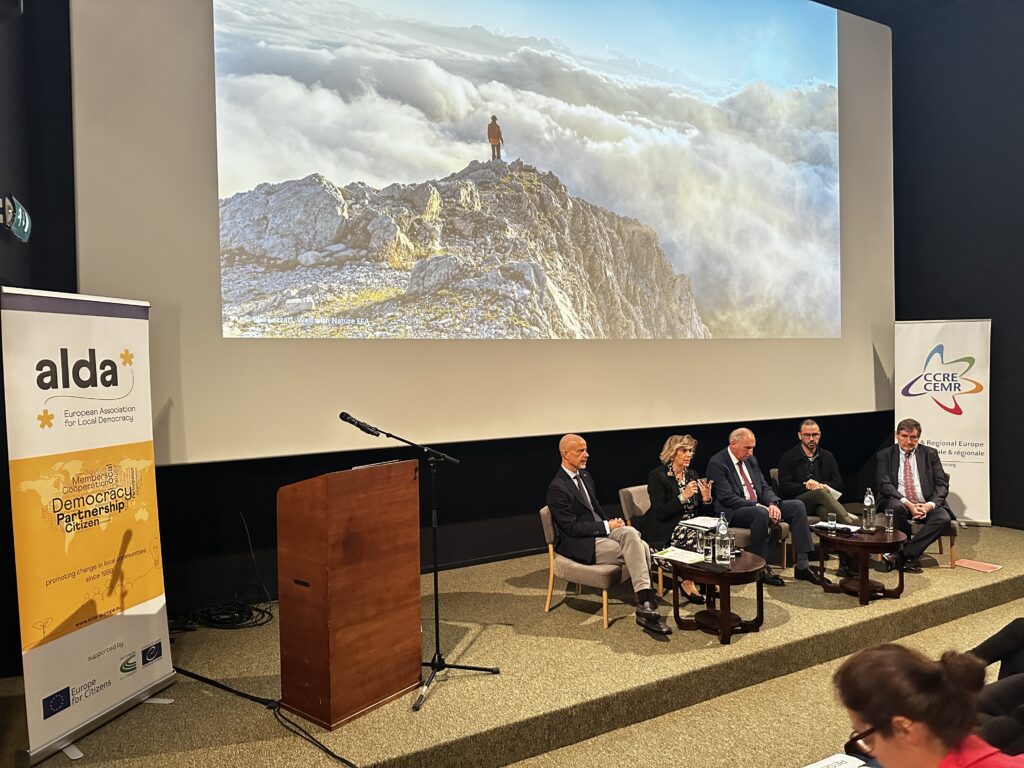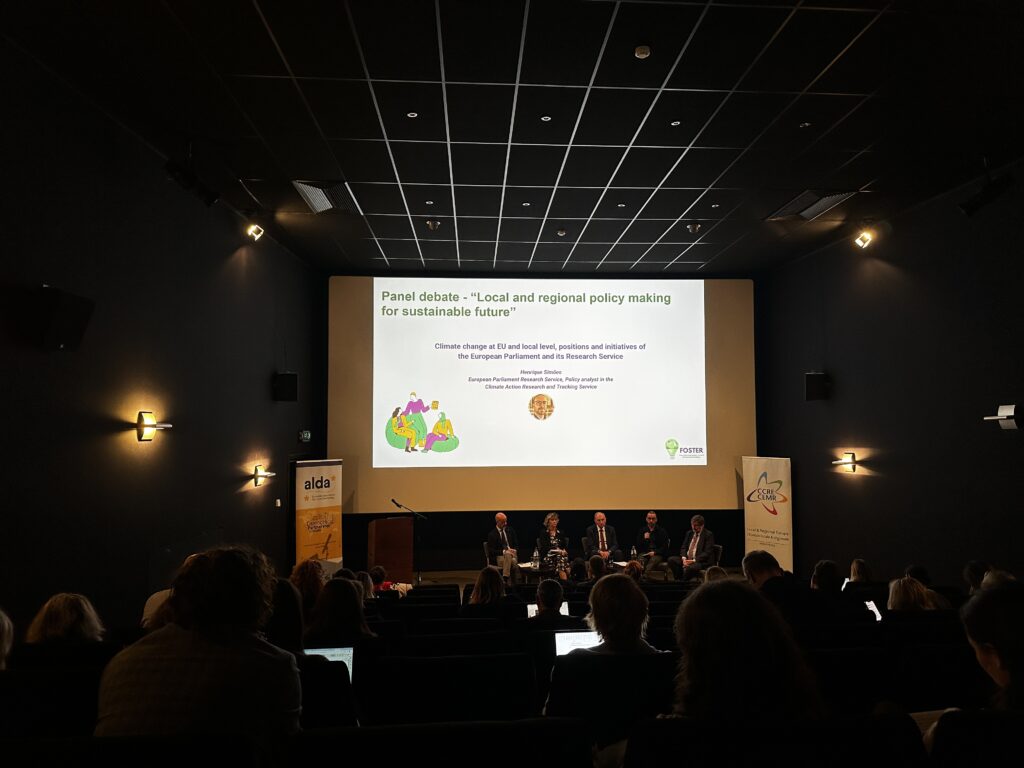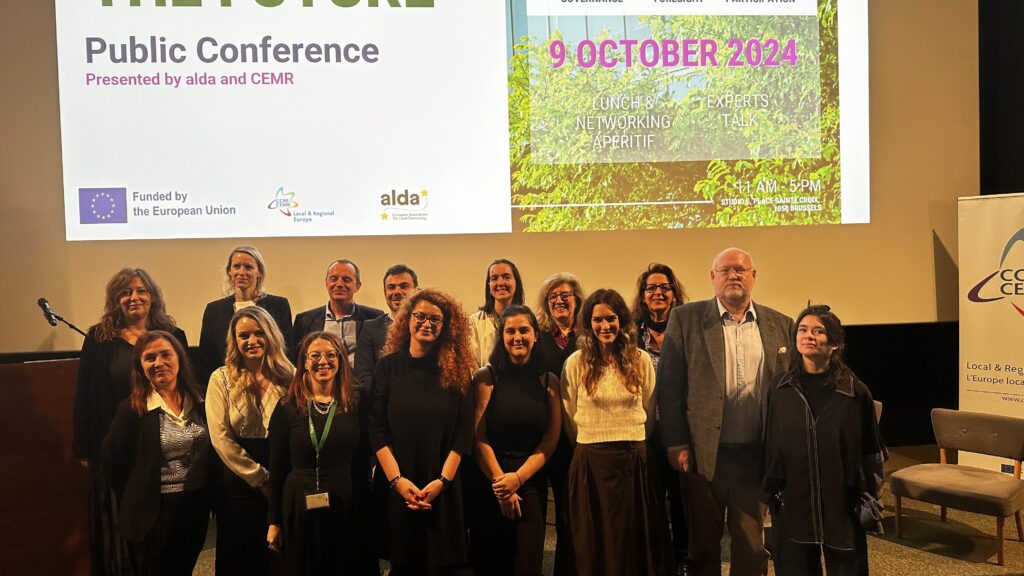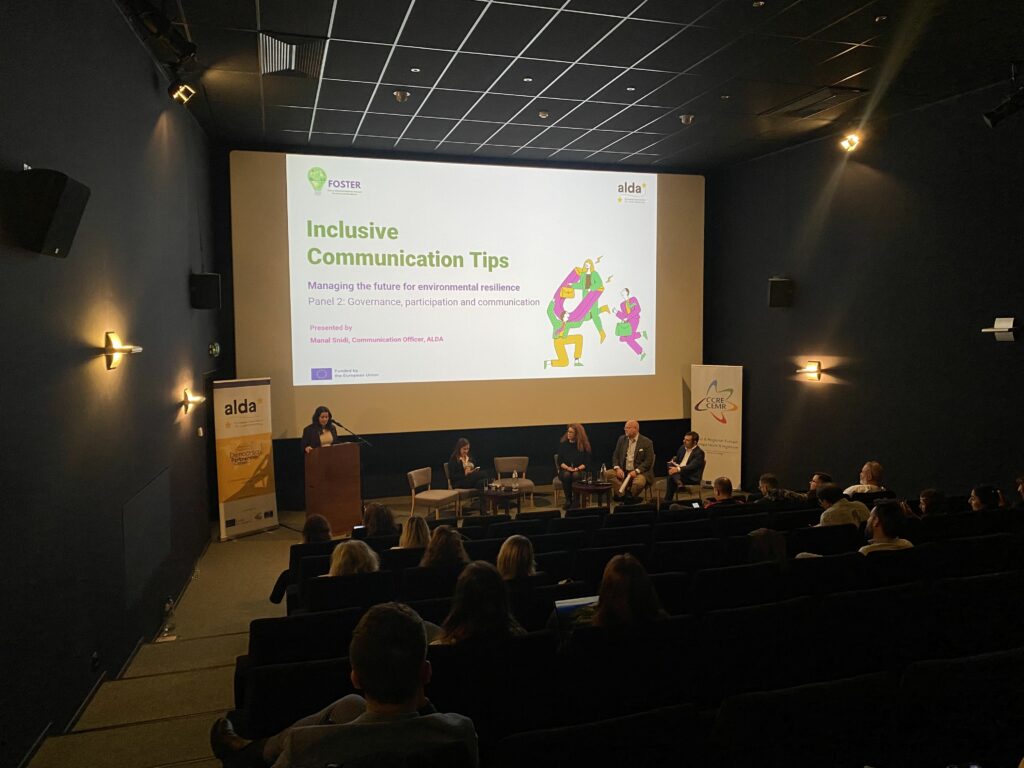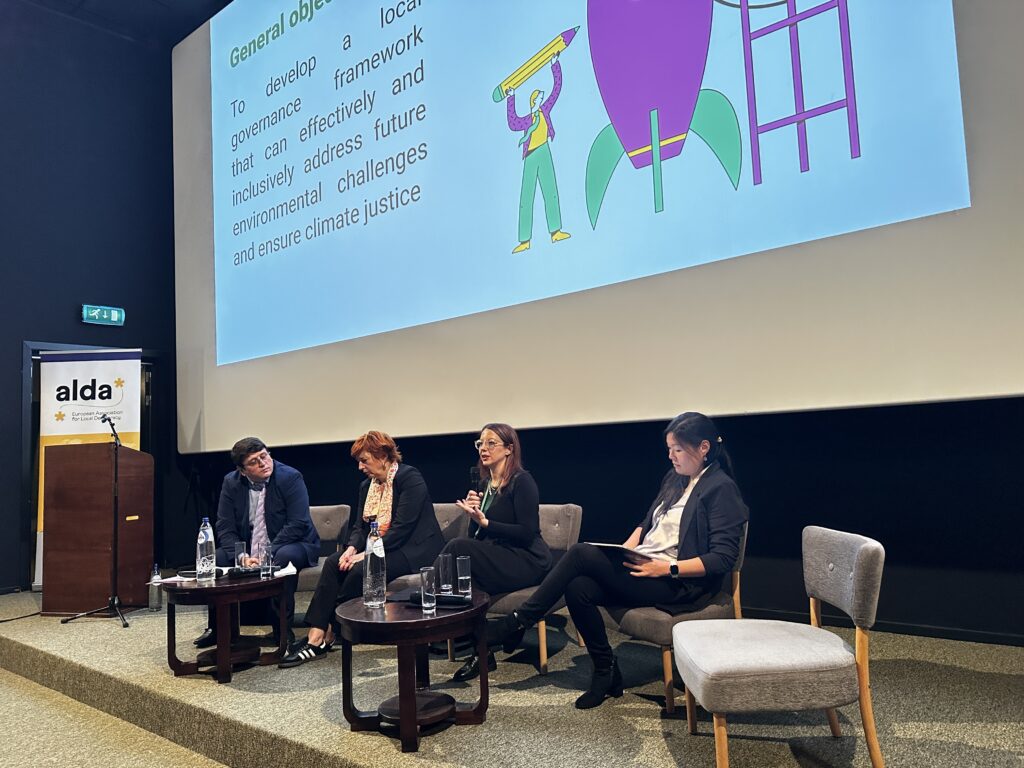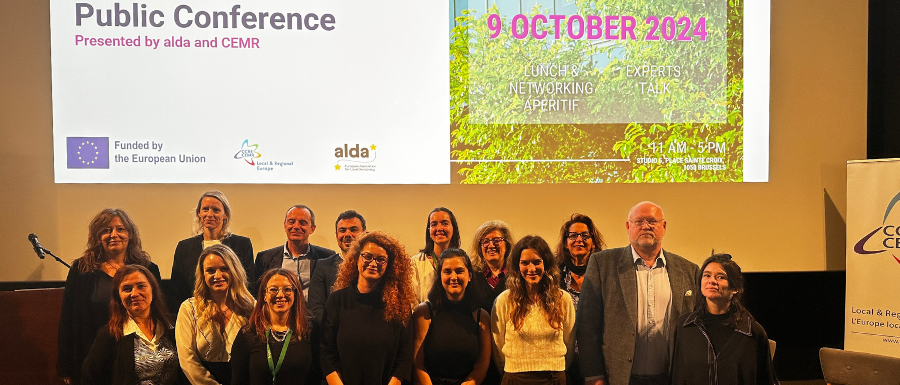The Public Conference “Managing the Future” took place on the 9th of October at 11.00am in Brussels at the Flagey conference venue.
The event was organised by CEMR- COuncil of European Municipalities and Regions and ALDA- European Association for Local Democracy within the FOSTER – Future oriented Solutions Toward Environmental Resilience, a two years project funded by the CERV – Citizens Equality Rights and Values program of the European Union.
The opening session started with introductory words by Durmish Guri, Director of Projects and Programmes of CEMR, and Nataša Vučković, President of ALDA. They both highlighted the key role of local and regional governments (LRGs) in the strategic foresight planning, and the need to engage the LRGs in the fight against climate change.
Nadia Di Iulio, Project Manager at ALDA, briefly presented the FOSTER project framing the conference.
As a keynote speaker, the Conference was proud to announce Riyong Kim, Head of Programme, Sustainability Transitions at the European Environment Agency. Ms Kim presented the recent EEA’s publication focusing on Sustainability governance under highly uncertain and complex conditions. She also highlighted the strategic policy considerations to take into account when foresight planning.
The opening session was followed by the panel debate “Local and regional policy-making for a sustainable future”. Moderated by Antonella Valmorbida, Secretary General of ALDA, this session was the occasion to hear from policy experts and a mayor about their experiences and hear about strategic foresight for climate change from different points of view. In this sense, Henrique Simões, Policy analyst in the Climate Action Research and Tracking Service of the European Parliament Research Service described the positions and research of the research institute on climate change at EU and local level. Jānis Vītoliņš, Mayor of Ventspils in Latvia, showcase some good practices and examples on how to deal with the local consequences of climate changes. Pierluigi Brombo, Head of Unit at the European Economic and Social Committee, gave the audience an introduction on strategic foresight and its dimensions, giving some of the basics about foresight planning. Finally, Eamonn Noonan, Consultant and former European official, discussed the participatory dimension of strategic foresight.
The afternoon session took the form of an experts’ talk and peer exchange, hosting FOSTER project partners who discussed key aspects in strategic foresight, from the perspective of different organisations and countries. Moderated by Pedro Bizarro, CEMR Project Lead – Climate, Energy & Urban Development, was divided around two thematic panels: Foresight and strategic planning and Governance, participation and communication.
To mention some, in the first panel, Flavia Pesca from IRS (Italy), gave practical examples on how to shape the future with participatory foresight. Evita Agapitou and Ioanna Stogiannari from IASIS (Greece) presented data collection techniques within crisis intervention methodologies.
In the second panel, the first intervention was from Elena Simeonova, UBBSLA (Bulgaria) who described the decentralisation challenges in the Black sea region. Mihaela Damian from AMR (Romania), talked about the implementation of citizens participation in the decision making process at the local level. The last intervention of the day was presented by Manal Snidi, Communication officer from ALDA, and focused on inclusive communication tips.
After the experts’ talk, Nadia Di Iulio thanked the participants, and the Conference was closed.
The day was concluded by a Networking aperitif, and ended at 5:30.
The FOSTER conference brought together experts and local leaders to work together on creating strong, prepared communities across Europe, focusing on practical ideas and new ways to make policies
The Public conference gathered almost 100 participants, coming from a wide range of European countries, organisations and backgrounds. Indeed, the Conference welcomed representatives of several national associations of local and regional governments (Denmark, Latvia or Portugal) as CEMR members, representatives of think tanks and research institutes such as EPD, but also officers from the Brussels municipality, and representatives from the EU institutions (European Parliament, European Commission).
On the following days, 10-11 October, the Training of Trainers took place at CEMR headquarter.
The ToT was addressed to partners only, with the scope to:
- build a common understanding and language on foresight and participatory democracy.
- build and\or improve partners’ capacities and knowledge around the two main project pillars (participatory democracy and strategic foresight)
- set the basis for the local cascade training (WP3) and the local path (WP6-8-10-12)
The ToT lasted 1 day and a half (total of 8h) and was structured in 4 modules:
- Participatory democracy
- Foresight and scenario planning
- Inclusive communication
- Gender and anti discrimination policy
The training was conducted by ALDA and IRS as partner experts respectively on Module 1, 3, 4 and Module 2.
In the first training day (10 October), ALDA opened the morning session bringing partners into the Module 1 – Participatory democracy
The afternoon session was dedicated to Module 2 – Foresight and scenario planning, conducted by the IRS.
The second training day was conducted by ALDA who introduced the Module 3 and 4, and partners took the occasion to meet in presence and hold a SC meeting, to review the project workflow, clarify some tasks, discuss and plan the next steps.
The overall event, conference and training, were an opportunity for the participants, and for the FOSTER project’s partners, to hear from other experts in the field of strategic foresight, from theoretical and practical point of views, with different layers and levels of understanding.
Moreover, the event was the occasion for all the partners to meet for the first time. This meeting helped with the building of a common understanding around the initiative, and made the partners get a sense of consortium and partnership around the FOSTER project.
About the project
FOSTER aims to contribute to the development of governance frameworks that can effectively and inclusively address future environmental challenges at local level, by fostering strategic foresight and preventative local management of climate change-related phenomena. Started in September 2024, during the project, participants build capacity for foreseeing and analysing future socio-economic needs as consequences of climate change at local level; as well as, co- designing potential solutions bringing together all relevant stakeholders and community representatives at public and private level. Finally, international online networks are created to share best practices, materials and widely raise the debate on future oriented environmental governance.
